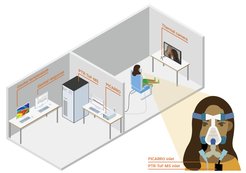Love is in the air
Sexual arousal can be determined from breath
More blood flow to the genitals, an increased pulse and dilated pupils: These physical characteristics reveal that a person is sexually aroused. But lust can also be detected in the breath, as a study of an international research team has now shown. According to the study, a characteristic signature of volatile molecules is found in the breath of sexually aroused people. The test subjects exhaled less isoprene and carbon dioxide, while the concentration of degradation products of certain neurotransmitters increased. According to the researchers, this discovery may help clinically to better assess sexual arousal and thus contribute evaluating sexual difficulties.

The task was very simple: twelve men and twelve women were asked to watch different ten-minute film clips in random order in the Research Laboratory on Human Sexuality, SexLab for short, at the University of Porto. They watched a nature travel documentary, a horror film, a football match and an erotic film. Meanwhile, the Max Planck team continuously analyzed the breath of the test subjects for more than one hundred volatile organic compounds, and at the same time researchers from the SexLab measured the sexual arousal of the test subjects, for example by determining a rise in temperature in the genitals.
A chemical trace of the happiness hormone

With the start of the erotic film, the amount of various volatile organic compounds in the breath of the aroused participants increased rapidly, other compounds decreased rapidly. In addition, the levels variated less than in the unexcited state. "The fact that the concentration of CO2 and isoprene in the breath decreased could be because the genitals had more blood flow, while the muscles and lungs had less," says Nijing Wang, lead author of the recently published study. "In men, we found phenol, cresol and indole. These seem to be typical indicators of sexual arousal." The substances are formed during the degradation of the amino acids tryptophan, a precursor substance of the neurotransmitter serotonin, and tyrosine, from which our body forms dopamine and noradrenaline. It is known that these messenger substances play an important role in erotic feelings and are formed quickly. Among other things, they bring people into a euphoric state of mind during sexual arousal. In one test subject, the researchers were even able to detect dopamine, which is also considered a happiness hormone, directly in her breath.
"In general, the results of the breath analysis were clearer in men than in women," says Giovanni Pugliese, postdoc at the Max Planck Institute for Chemistry. For example, the researchers did not observe the same increase in volatile substances in women as in men. Moreover, some women were not particularly aroused by the erotic films. "To increase the overall significance, we need to repeat the study with a larger number of subjects," adds Giovanni Pugliese.
Contribute evaluating sexual difficulties
Studying the signature of eroticism in breath more closely is worthwhile, not least from a medical point of view: "The possibility of non-invasively determining a person's sexual arousal through their breathing would be a great advance for sex research," says Pedro Nobre, the head of the Sexlab and Professor at the University of Porto in Portugal. Until now, such studies have been hampered by the fact that in most cases sensors have to be placed directly in the genital area of the test participants. According to Nobre, an experienced sex researcher, breath analysis can facilitate the assessment of sexual arousal and ultimately help in the process of evaluation of sexual difficulties.
The idea for the study came from atmospheric scientist Jonathan Williams from Mainz. His team had already been able to show in earlier studies that people constantly emit chemical signals into the air via their breath and skin, which can change depending on their emotional state. For example, in a crowded cinema auditorium, they detected characteristic volatile molecules that viewers exhaled during very exciting scenes. "With the study on sexual arousal, we wanted to test whether other strong emotions also leave a trace in the breath," says Williams. “To better characterize the chemical signals, we tested this under controlled conditions rather than in the complex environment of a cinema."
The subject of further studies for the Max Planck researchers will now be the question of the extent to which we also send fleeting chemical signals in a conversation, when kissing or during an embrace and our counterpart perceives these - consciously or unconsciously.
The study was conducted within the framework of the Horizon 2020 project IMPACT of the European Commission. It was approved by the Ethics Committee of the Faculty of Psychology and Education Sciences of the University of Porto. Consent was obtained from all subjects before the study.

